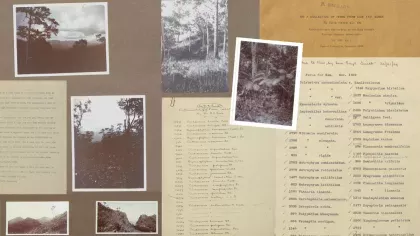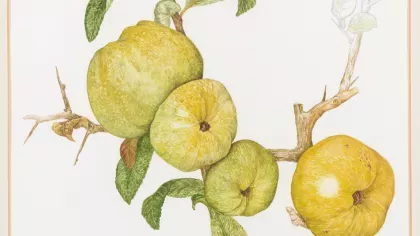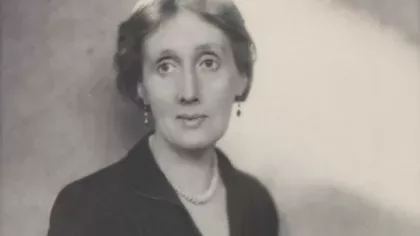Richard Oldham: The Last Botanical Collector
Learn about the hardships faced by the unfortunate botanical collector Richard Oldham on his journey around Japan, and find out what led to the end of his contract with Kew.

The Directors' Correspondence team has been reading through the letters of Richard Oldham (1837-1864), a gardener sent out by RBG Kew as a botanical collector in China and Japan. The collection includes a copy of Oldham's contract which required him to stay on board ships designated by Sir William Jackson Hooker. From the letters it is clear that this agreement did not end well, and Oldham was in fact the last full-time botanical collector to be employed by RBG Kew in this way – but was he the idle and wayward botanist that Hooker presumed him to be?
Oldham's letters have given us a great insight into the trials and tribulations he encountered during his time in Japan; transport problems, bad weather, financial troubles and illness all hindered his collecting to some degree. Unfortunately his slow progress led Hooker to accuse him of being idle, perhaps expecting Oldham to take after his predecessor Charles Wilford, who was dismissed after he stopped sending specimens back from Japan.
Oldham encountered many transport problems, at one point waiting four months to board his next ship and missing an opportunity to collect in Yokohama as a result. His plight was taken up by Henry Fletcher Hance, the British Vice Consul in Whampoa, who wrote to Hooker saying: "I cannot but think that his being bound to a ship ... has taken away much of his time, & that he would have done better could he stay for a whole season at one place". His travels were also fraught with danger owing to the political unrest in Japan at the time. He describes how it was not safe for him to visit Tokyo [then called Yedo] after a "vile and murderous" attack had recently taken place on the British Legation there.
Financial problems also added to Oldham's woes and he repeatedly complains about the high cost of living and unfavourable exchange rates in Japan. He tries to claim for expenses such as equipment, boats, specimen purchases and doctor's bills but stresses that he pays for wine and beer out of his own salary and that if he did not drink occasionally he would be "entirely unfit for further exertion". Unfortunately, in a strongly worded response, Hooker shows no sympathy and instead reprimands Oldham for not sending the necessary proof of expenditures in order to settle his accounts. On top of all this, Oldham suffered from sea sickness which affected much of his collecting while on board the ships. He also complains of neuralgia, rheumatic pains and of contracting smallpox in Amoy, which led to one of his collections being spoiled. Oldham eventually succumbed to dysentery and died at the age of 27.
Shortly before he died, Oldham decided to leave the ship he was on and travel to Taiwan [then called Formosa] to further his collections. Hooker, however, took this as a resignation of Oldham's duties from RBG Kew and refused to fund him further, thinking that he intended to profit from the collections. Despite these many hindrances, Oldham sent back over 13,000 dried specimens from Japan and Taiwan and several species, such as Gypsophila oldhamiana and Scolopia oldhamii, are named after him. Other letters in the DC collection attest to his diligence and enthusiasm for his work - indicating that Hooker may have unfairly judged the last botanical collector.
Oldham's letters are currently being digitised as part of the DC digitisation project and will be available to view to subscribers on the JSTOR Plant Science website in the future.
-Charlotte-


